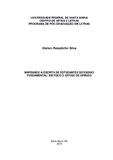| dc.creator | Silva, Cleiton Reisdorfer | |
| dc.date.accessioned | 2019-04-25T14:47:17Z | |
| dc.date.available | 2019-04-25T14:47:17Z | |
| dc.date.issued | 2019-03-08 | |
| dc.identifier.uri | http://repositorio.ufsm.br/handle/1/16310 | |
| dc.description.abstract | In this work, we seek to analyze the recurrent linguistic-discursive characteristics in opinion articles produced by students of basic education. As a theoretical contribution to the analysis of the corpus, we start from the notion of genre of the Social-rhetoric (MILLLER, 1984, 2014; BAZERMAN, 2011a; 2011b; 2015), CARS Model (SWALES, 1990) and the concepts of the Systemic-Functional Grammar (SFG) (HALLYDAY, MATTHIESSEN, 2014).The research corpus consists of 59 articles of opinion produced by students of the Ninth Year of Elementary Education in the context of the classroom. The results of the analysis indicate that the rhetorical structure of the opinion article produced by these students presents movements and characteristic steps of the communicative situation of the production of the texts. We verified that the opinion articles written by the students present the following movements: 1 - Contextualization; 2 - Presentation of the thesis; 3 - Defense of the thesis; 4 - Synthesis and reiteration. Quantifying the data, we verified that students use Movements 2 and 3 more frequently, but they present difficulties in contextualizing and synthesizing their positions. The analysis of ideational meanings has shown that students use material processes associated with participants generic names to indicate facts and actions, identify and attribute characteristics to text field, to a semiotic object or semiotic abstraction through relational processes, and position themselves using personal pronouns associated with relational processes. The analysis of interpersonal resources indicated that, among these resources, students predominantly use modal negations and verbs in texts. Finally, the analysis showed that the texts present a rhetorical structure that is a characteristic of that communicative situation, characterizing the texts as scholarly opinion articles. The observed discursive and linguistic elements evidence the need for greater study and deepening of this genre in a school context. | eng |
| dc.language | por | por |
| dc.publisher | Universidade Federal de Santa Maria | por |
| dc.rights | Attribution-NonCommercial-NoDerivatives 4.0 International | * |
| dc.rights.uri | http://creativecommons.org/licenses/by-nc-nd/4.0/ | * |
| dc.subject | Gênero | por |
| dc.subject | Artigo de opinião | por |
| dc.subject | Estrutura retórica | por |
| dc.subject | Genre | eng |
| dc.subject | Opinion article | eng |
| dc.subject | Rhetorical structure | eng |
| dc.title | Mapeando a escrita de estudantes do ensino fundamental: em foco o artigo de opinião | por |
| dc.title.alternative | Mapping the students writing of elementary education: in focus the opinion article | eng |
| dc.type | Dissertação | por |
| dc.description.resumo | Neste trabalho, buscamos analisar as características linguístico-discursivas recorrentes em artigos de opinião produzidos por estudantes da educação básica. Como aporte teórico para análise do corpus, partimos da noção de gênero da Sociorretórica (MILLLER, 1984, 2014; BAZERMAN, 2011a; 2011b; 2015), do Modelo CARS (SWALES, 1990), dos estudos da argumentação (PERELMAN; OLBRECHTS-TYTECA, 2014; TOULMIN, 2001) e dos conceitos da Gramática Sistêmico-Funcional (GSF) (HALLYDAY; MATTHIESSEN, 2014). O corpus de pesquisa é constituído de 59 artigos de opinião produzidos por alunos Nono Ano do Ensino Fundamental em contexto de sala de aula. Os resultados da análise indicam que a estrutura retórica do artigo de opinião produzido por esses alunos apresenta movimentos e passos característicos da situação comunicativa de produção dos textos. Verificamos que os artigos de opinião escritos pelos alunos apresentam os seguintes movimentos: 1 - Contextualização; 2 – Apresentação da tese; 3 - Defesa da tese; 4 – Síntese e reiteração. Quantificando os dados, verificamos que os alunos utilizam com maior frequência os Movimentos 2 e 3, porém apresentam dificuldades ao contextualizar e sintetizar seus posicionamentos. A análise dos significados ideacionais demonstrou que os alunos utilizam processos materiais associados a participantes nomes genéricos para indicar fatos e ações, identificam e atribuem características ao campo do texto, a um objeto semiótico ou a uma abstração semiótica por meio de processos relacionais, e se posicionam utilizando participantes pronomes pessoais associados a processos relacionais. A análise dos recursos interpessoais indicou que, dentre esses recursos, os alunos utilizam predominantemente negações e verbos modais nos textos. Por fim, a análise demonstrou que os textos apresentam uma estrutura retórica característica daquela situação comunicativa, caracterizando os textos como artigos de opinião escolarizados. Os elementos discursivos e linguísticos observados evidenciam a necessidade de maior estudo e aprofundamento desse gênero em contexto escolar. | por |
| dc.contributor.advisor1 | Pinton, Francieli Matzenbacher | |
| dc.contributor.advisor1Lattes | http://lattes.cnpq.br/1979338178408389 | por |
| dc.contributor.referee1 | Silva, Wagner Rodrigues da | |
| dc.contributor.referee1Lattes | http://lattes.cnpq.br/6247921557725424 | por |
| dc.contributor.referee2 | Negreiros, Gil Roberto Costa | |
| dc.contributor.referee2Lattes | http://lattes.cnpq.br/5584643092386755 | por |
| dc.creator.Lattes | http://lattes.cnpq.br/3638098088283727 | por |
| dc.publisher.country | Brasil | por |
| dc.publisher.department | Letras | por |
| dc.publisher.initials | UFSM | por |
| dc.publisher.program | Programa de Pós-Graduação em Letras | por |
| dc.subject.cnpq | CNPQ::LINGUISTICA, LETRAS E ARTES::LETRAS | por |
| dc.publisher.unidade | Centro de Artes e Letras | por |



